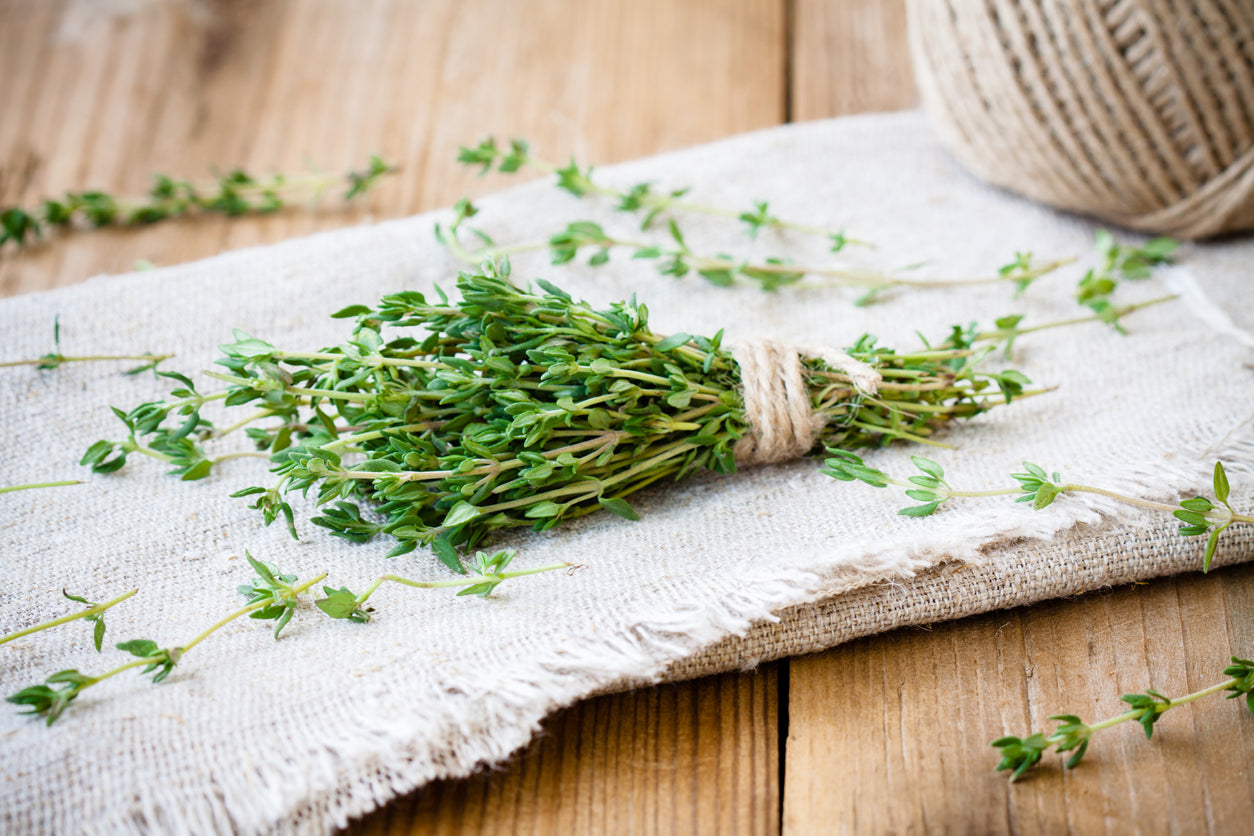“It’s about thyme” - 4 unexpected benefits of this piquant herb

Thyme, botanically known as Thymus vulgaris, is a common garden herb and popular cooking spice. But this simple description doesn't begin to address all the multifaceted benefits of this underrated "herbal hero!"
In fact, you may find yourself surprised by some of the powers and properties hidden inside this unassuming member of the mint family. So let's look at four compelling reasons to add some thyme to your life.
Ease coughs with thyme tea
Suffering with the routine - but miserable - symptoms of a cold or flu? You might want to try a cup of thyme tea. Thymol, one of the active constituents in thyme, is a natural expectorant - which helps break up mucus - and an antispasmodic, which may help alleviate coughing. And carvacrol, another thyme compound, has been shown to have antioxidant and anti-inflammatory effects. It's not hard to see why many integrative health care providers advise thyme tea for scratchy throats, sniffles, and coughs!
And thyme tea is a breeze to make. Use a teaspoon of dried thyme (or two teaspoons of fresh thyme) for each cup of boiling water. Allow to steep for ten minutes, then cool, strain and sip. If desired, you can sweeten it with raw honey - and add some vitamin C-rich lemon peel.
You can also enjoy the healing benefits of thyme essential oil. For a relaxing soak that can help ease congestion, combine three drops of thyme oil with a tablespoon of olive oil and add to a warm bath. (Be careful getting out, as this combo can make the tub slippery!) Before using thyme tea or thyme oil, check with your integrative health care provider.
Brighten mood with thyme oil aromatherapy
You may have noticed that thyme's clean, welcoming, woodsy scent makes you feel calmer, relaxed, or more optimistic. If so, you're not alone. Aromatherapists have long used thyme essential oil to promote relaxation. Research shows that carvacrol in thyme can enhance the release of dopamine and serotonin, a pair of neurotransmitters needed for a stable mood. So if you're looking to brighten your outlook or soothe jangled nerves, give thyme oil a try. However, when working with thyme essential oil, be aware that it is only for topical and aromatherapy use - and not intended to be taken internally.
Fight acne with thyme
You can make thyme essential oil part of your "natural health toolbox" for complexion care. One older but a still-influential study showed that thyme essential oil was effective against Propionibacterium acnes, the pathogen behind - you guessed it - acne. Thyme's natural antiseptic qualities mean that it has antiviral and anti-fungal properties, as well.
To use thyme oil on the skin, mix one drop of thyme essential oil with ten drops of almond or jojoba oil and gently dab on blemishes with a cotton ball to avoid the eye area. Before trying this technique, do a small patch test on your inner arm 24 hours ahead. The next time you have an annoying "zit" you'd like to "zap," go for thyme essential oil!
“Bugs-B-Gone” - Repel insects naturally
It's not just microscopic troublemakers that are discouraged by thyme. It also works to repel much larger bugs, meaning: pesky insects. In a 2021 study published in Psyche: The Journal of Entomology, researchers found that thyme essential oil was effective against both adults and larvae of Anopheles arabiensis, a malaria-carrying mosquito found in sub-Saharan Africa.
For a safe and biodegradable alternative to synthetic insecticides, why not whip up your thyme-based natural insect repellent? Mix four drops of thyme essential oil with a teaspoon of olive oil and apply to exposed skin. (Again, take care to avoid the eyes). If you don't care for the feel of an oily solution, add five drops of thyme oil to a cup of plain water and spritz it on.
Thyme has so many handy uses that it's easy to forget one of its biggest gifts: its distinctive flavor. You can use fresh or dried thyme to enhance marinades, sauces, and recipes. While thyme is particularly flattering to more delicate-tasting fish - such as flounder and tilapia - it can also "hold its own" in hearty poultry and beef recipes. Or use thyme to bring out the flavor in potatoes, add savor to salads or give popcorn some zip.
It's time to make time for thyme! This useful herb makes a great addition to your healthy diet.
Sources for this article include:






